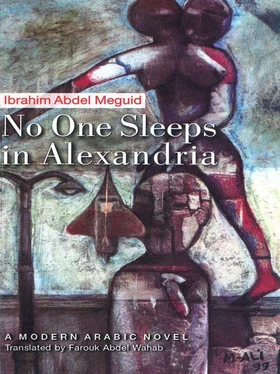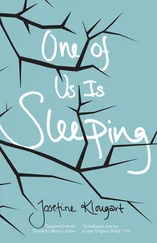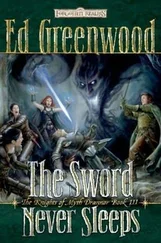He did not say the word that everyone had anticipated. He fell silent, but the silence was broken by laughter that shook the precinct to its foundations. The corporal became angry, and some policemen were startled. The laughter died down in hoarse spasms. Just then, three policemen rushed inside the precinct looking frightened, each holding the wide leather belt he had taken off his pants. It seemed they had been in a battle that they had lost. The corporal shouted at them, “What’s wrong with you?”
“A big brawl, Mr. Corporal, at Ban Street.”
“Muslims and Christians?”
“No. Southerners and peasants.”
Magd al-Din’s heart beat fast. The corporal said to the frightened policeman, “Peasants can’t fight. It’ll end peacefully.”
“Not this time. Bahi Khalil fancies himself a big leader and has sworn to break the backs of the southerners.”
“Any casualties?”
“Many.”
Magd al-Din almost collapsed when he heard Bahi’s name. The corporal ordered the policeman to get his colleagues from their room behind the precinct and for them to bring their guns. He called security headquarters on the telephone and requested a security detail. Then he got up, went over to the cell, and opened the door, yelling, “Get the hell out of here. All hell’s broken loose, you sons of bitches.”
The first one out was Magd al-Din.
From one town to another I set sail.
Why is the wind so contrary?
Why am I ever a stranger, ever on the move?
Folk song from Egypt
Ban Street was now almost deserted except for the police. A security force with clubs and shields had been dispatched and took up positions on both sides of the street. A big paddy wagon stood there, filled with peasants and southerners alike. The soldiers were still chasing the brawlers in the alleys and bringing some of them back to the paddy wagon. Women were watching through closed windows; men and boys stood in the doorways. The sound of an ambulance came from the direction of Karmuz. A woman collapsed on the ground near Bahi, crying silently. She was barefoot, her black clothes tattered, hair disheveled, eyes blank, but she did not seem insane. There was another woman, a younger one, weeping quietly in the arms of Magd al-Din, who kept patting her on the back, his eyes fixed on his brother’s beautiful face covered with blood, his eyes still open, gazing at Magd al-Din in sorrow and fear for his destiny. There was a look of apology to his younger brother in his eyes.
“Go inside, Zahra.”
It was obvious that the blow had split Bahi’s skull from behind. Nothing could be done. The battle had taken place right in front of the house, as if Bahi had wanted someone to see him fighting. No one had believed his old stories. Only Magd al-Din did, always. Today he no longer had to fight anyone. Magd al-Din stepped forward, then sat down, placing his brother’s head on his thigh. He shook with a pain that no human alive had ever felt.
The paramedics and a young police officer went over to him. The woman who had collapsed near the body and whom Magd al-Din had not noticed until now was frightened by the police officer. She got up and walked away quickly.
“Who’s this woman? Anybody know her?” the officer asked a policeman.
“She’s some crazy woman who was always following the dead man.”
The officer did not understand, but Magd al-Din’s eyes grew wider as he remembered Bahiya.
“You know the victim?” asked the officer,
“He’s my brother.”
“Do you accuse anyone?”
Magd al-Din did not reply.
“After the burial you can make a statement or a charge,” said the officer.
He motioned the paramedics to carry the body. They removed it from the lap of his brother, who could not stand up. He stretched his hand to the man standing next to him.
“Give me a hand, brother.”
It was the gaunt man who had been his lockup companion a short while earlier. The man extended his hand.
“Dimyan. My name is Dimyan. Get a grip on yourself,” the man said as Magd al-Din got up.
A man Dimyan recognized came over to them. It was Khawaga Dimitri Faltaws, Magd al-Din’s landlord and one of the neighborhood’s educated Christians, who worked as a labor supervisor at the municipal garage in Hadra. Dimyan had asked him to get him a job, any job in the city, but the man apologized nicely after a month for not finding him a job.
“Do you know him, Dimyan?” Dimitri asked.
“Yes. He’s my friend,” replied Dimyan, pleased that Dimitri had not forgotten him.
“Then ride in the ambulance with him. I’ll catch up with you at the government hospital in a cab. He’s a stranger in town.”
Magd al-Din listened as his eyes followed the woman who had been sitting near Bahi’s body. It was none other than Bahiya. Now she was at the far end of the street. God have mercy.

The ambulance drove off, with the body laid on a stretcher between two long seats on one of which sat Dimyan and Magd al-Din, while the two paramedics sat on the other. The ambulance was not going fast, and did not blow the siren that would have cleared the way through crowds. The road was not crowded, and the ambulance was carrying a corpse.
The slow movement of the car resembled that of a gentle horse or a boat on calm waters. Magd al-Din was now smiting the sea with his arm since he had no staff, and it parted, and in the middle was a grassy pathway on which the gentle horse moved gracefully. Magd al-Din, vexed, smote the air and it parted, and on each side was a smooth, white, glass wall on which pearl-like snowdrops gathered — white tears, white blood and pain. He walked in the space that the air had deserted and was drenched in sweat. He took off his gallabiya, his vest, and his undershirt, leaving only his underpants, which now stuck to him, becoming part of him. Everything rolled down the walls in front of him. Beautiful women and maidens and stones and monkeys and old women clad in black and a familiar face that he did not remember, a face he had often seen and heard calling out his name, “Come, come, Magd al-Din.” He followed the voice without knowing where. He could not go back and could not break the kind voice’s spell. In front of him rolled all the images he had seen before: his brothers who had been killed, his dead father, his blind mother, his sisters and his cousins, all the Talibs, and the mayor. But they were all children, running and laughing. He wanted to catch one of them, anyone, but could not. The kind voice would not let him go back until he reached the end of the road, the edge, from which white vapors rose and where he could see only tortured arms flailing and hear only groans. He rose up, nearly on the tips of his toes. then he collapsed.
“Don’t cry, friend. You’ll kill yourself.”
The thin Dimyan patted Magd al-Din on the shoulder and put his arms around him. He had been crying in pain. Bahi’s story had ended. Bahi himself had put an end to it.
He had returned after the Great War. The country was gripped by the revolution for years afterwards. Bahi told Magd al-Din “This village of ours does not move at all. It’s like a big beetle that never leaves its hole.” It was he who had to stir it back to life.
His mere appearance on the scene was enough to rekindle the fire. He had come back stronger than he had left, his features scorched by both the sun and the cold. He now had a thick mustache, had become taciturn, and early wrinkles showed under his eyes. His face had also acquired a new pained look.
The family did not believe that he had been in the army all that time. “Where did they take you?” “From the road.” “Why didn’t you tell them who you were and what family you came from? They would’ve let you go.” “I told them, but they didn’t let me go.”
Читать дальше













